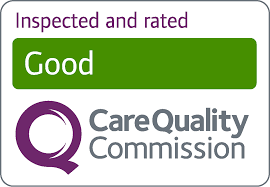A Live-in Care Agency You Can Trust
If you or a loved one are looking for an alternative to a residential care home or nursing home then our live-in care service could be the perfect solution. Many families are now choosing to hire a highly experienced living-in carer to care for their loved ones in the comfort of their own homes rather than use a care home. This enables you or a loved one to continue living independently at home with the around-the-clock care and the support of their very own professional personal carer.
Novus Care is a live-in care agency you can trust. We have been providing live-in home care for over 14 years and are regulated by the Care Quality Commission. Still family-run, we are a live-in care agency built on a foundation of family values, therefore we treat each one of our clients as if they were a member of our own family. We can provide live-in care services in every town and village across England.
We are committed to providing bespoke and personalised live-in care services at home. We provide clients with safety and the opportunity to retain independence, while giving families peace of mind. Our live-in care services are fully managed and regulated by the Care Quality Commission overseen by experienced local live-in care managers. We pride ourselves on enhancing the quality of life of our clients, enabling them to lead as independent a life as possible in the comfort of their own home. So what is live-in care?
What is Live-in Care?
But what is live-in care? Our live-in care services enables you or a loved one living with a variety of health care needs to remain in the comfort of your own home with the care and support of an around-the-clock, live-in carer.
From general housekeeping, meal preparation and companionship through to personal care and more complex needs, Novus Care can help. We have a wonderfully devoted live-in care team ready and waiting to listen and understand your requirements so that we can provide you with the most excellent live-in care. From live-in carers for the elderly. to 24 hour live in care for those with debilitating conditions, we’re here to help.
What do Live-in Carers do?
What live-in carers do is a question we are asked frequently. At Novus Care we truly believe in the quality of care we provide. Our highly experienced live-in carers are there to assist with personal care, helping with mobility, administering medication, housework, hoisting and even caring for a pet. Our live-in care services can support a wide variety of medical conditions at home including complex care. They can help with:
| Personal Care | Housekeeping | Companionship |
| Cooking | Administering Medication | Support for Appointments |
| Complex care | Stoma Care | Catheter Management |
| Managing PEG Feeds | Blood Sugar Monitoring | Caring for a Pet |
| Hoisting | Washing & Dressing | Shopping |
Medical Conditions we can Support at Home
We can provide around-the-clock care at home for someone living with a variety of medical conditions or even a couple living with different care needs. At Novus Care, we understand that people living with certain medical conditions may require a different approach to care and our carers are trained to provide the highest quality of care to you or a loved one living with the following conditions:
Types of Live-in Care we Provide
Whatever care requirements you are looking for we are able to help. Our live-in care services cater for an individuals needs and requirements. We can provide various types of care, such as 24-hour live-in care or other options as seen below:
How Much does Live-in Care Cost Compared to Care Homes?
The cost of live-in care is an extremely cost effective compared to care homes especially if you are requiring care and support for a couple. Discover how much live-in care costs here
Arrange your Free Live-in Care Assessment Today
As a flexible live-in care agency, we’re here to help and you can even trial our live-in care service on a short-term basis if required. To discuss our live-in care services in more detail or to arrange a no-obligation free care assessment, please get in touch with us today.
Get In TouchFrequently Asked Questions About Live-in Care
What does a live-in carer do?
A live-in carer will move into your home and is there to provide 1-to-1 care and to enable you or a loved one to continue living in their own home with the support of a professional live in carer. They are there to assist with personal care, medication, household tasks and complex care.
What care conditions can you support?
Our carers can support those age 18+ living with a variety of care conditions including complex care. These conditions include: Alzheimer’s and dementia, stroke, multiple-sclerosis, brain injuries, cerebral palsy, motor neurone disease and spinal injuries.
What housekeeping duties will my carer be able to help with?
A live-in carer will help with light housework which includes vacuuming, polishing, mopping floors and washing clothes.
What are carers not allowed to do?
Carers are not permitted to change dressings on open wounds or administer injections. These are carried out by the District Nurse. They also cannot do home improvements or DIY.
Do carers need their own room?
A live-in carer needs their own bedroom with a minimum of a single bed with a wardrobe or chest of drawers. Your live-in carer will be happy to share all other facilities.
What if I don’t get on with my carer?
As a live-in care agency, before we place a carer with you, we’ll ask you about the sort of person you get on well with, as it’s important that your chosen carer shares common interests and has a similar outlook on life. We will then match you up with a compatible carer. If you are unhappy, we will organise a change of carer.
How long will a carer stay with me?
A live-in carer on average works for approximately three-six weeks at a time before taking a break of one-two weeks, in which time we will send a replacement carer to cover.
What happens if my carer is sick or goes on holiday?
Once your Live-in Care package is in place then we will guarantee cover. We’ll arrange a replacement carer immediately until they are either well or return from their holiday.
Will my carer take care of my pet?
If you have stipulated this is a support requirement in your original care and support plan, then yes – we will ensure your carer is an animal lover who will be able to take care of your pet.
How will my care be managed?
We will designate a Care Manager who is responsible for the ongoing supervision of the care and support you receive. All our carers undergo routine observations, assessments and spot checks to ensure you are receiving the highest quality care.
When do carers have breaks?
To comply with employment law regulations, your carer is entitled to 14 hours of breaks per week. This is usually split in to two hours each day, or a few afternoons a week.
Who will cover these breaks?
If a family member or friend is unable to cover these breaks then another carer would be introduced to cover for the short break at an additional cost.
Will my live-in carer drive?
Some of our live-in carers are drivers – however if you would like your live-in carer to use your own car, you’ll need to arrange for them to be insured under your own policy at your own cost.
Can I have a male carer?
Absolutely. Taking into consideration personal care duties and the sort of person you would like takes priority.
Can I have a female carer?
Yes. To ensure you maintain your dignity and feel comfortable with your carer then you can specify you would prefer a female carer.
Have the carers undergone a DBS check?
Yes. All staff at our live-in care agency undergo a number of checks before being allowed to carry out home care duties. We check with the police and safeguarding authorities and make sure you are safe.
Why Choose Live-in Care?
It’s no wonder people are happier and more content when they are cared for from the comfort of their home, after all home is where the heart is. Studies have shown that we feel most comfortable when we are in our home environment and surrounded by those we love and things that we cherish.





